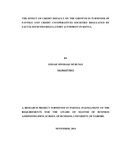| dc.description.abstract | SACCOs in Kenya have been endeavoring with an objective to maximize their returns
and growth through mobilization of members‟ funds and granting credit to members‟
development however the problem of credit default has made it difficult for SACCOs to
grow their wealth, achieve this objective and contribute favorably to national domestic
savings. Basically credit default occurs when borrowers do not repay the principal and
interest within the agreed time and in the expected amount leading to loss of income in
terms pending interest payments which could have been converted into new Credits. This
affects the liquidity of the SACCOs and eventually its cash flows thus reducing the
expected turnover. This study used descriptive research design to solicit information on
the effect of credit default ion the growth in turnover of SACCOs. The study targeted 135
SACCOs in Kenya which are regulated by SASRA; the sampling method chosen was
purposive sampling to form to select 35 SACCOs based in Nairobi. The study used
secondary data collected from financial statements and other relevant articles to obtain
information on turnover, credit defaults, members‟ deposits, total assets and total Credits
of SACCOs. A linear regression model of turnover versus credit default and member
deposits was applied to determine their relationships. The data was reviewed and
analyzed using SPSS Version 20 and used descriptive statistics. Correlation coefficient
revealed that credit default and turnover had a moderate negative influence on the growth
in turnover, while member deposits had an average positive influence on turnover at 95%
confidence level. It was therefore concluded that credit default affected annual turnover
of SACCOs. The tests showed that the overall regression model is a good fit for the data
as the independent variables can statistically predict the dependent variable. For policy
implications the study will insight SACCOs to curb credit default for envisioned
sustainability and growth. It agitates that SACCOs must continuously review their credit
policies and procedures to capture the character and creditability of Credit applicants for
recovery of all credits disbursed. | en_US |

